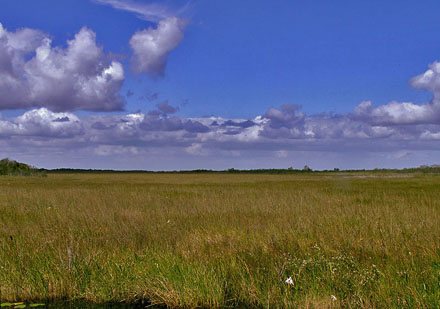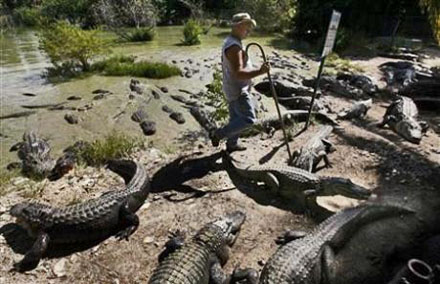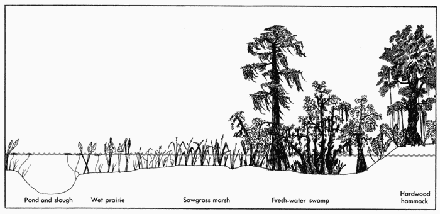Navigation
UNESCO Declares Everglades Endangered Site
A U.N. panel has declared the Florida's Everglades to be an endangered World Heritage site due to the wetlands' continued degradation, officials said on Friday, 30 July 2010.
 |
| Sunrise over the Everglades. NOAA's National Weather Service (NWS) Collection Photograph by Richard Frear National Park Service |
A U.N. panel has declared the Florida's Everglades to be an endangered World Heritage site due to the wetlands' continued degradation, officials said on Friday, 30 July 2010.
The wetlands' water inflows have fallen by up to 60 percent and pollution has produced excess plant growth and a decline in marine species, the World Heritage Committee of the United Nations Education, Scientific and Cultural Organization said at a meeting in Brasilia.
Agricultural and urban development have been the main reasons for the decrease in water quality and flow.
 |
| Sawgrass prairie in Everglades National Park north of Anhinga Trail. The primary feature of the Everglades is the sawgrass prairie. Photograph courtesy of Moni3 from Wikipedia. |
It is the second time the Everglades National Park, a wetlands refuge for birds and reptiles and largest mangrove ecosystem in the western hemisphere, has been added to the List of World Heritage in Danger. The agency made the decision after a request from the United States.
 |
| Bob Freer of Everglades Alligator Farm in Homestead, Florida, walks through a group of American alligators as they wait for feeding, October 2, 2006. Photograph by Hans Deryk |
The Everglades, known for its sawgrass prairies and alligators, were first declared an endangered site in 1993 following damage caused by Hurricane Andrew. The area was removed only in 2007.
"We commend the USA's request to re-inscribe the site on the danger list, and its plans for major infrastructure overhaul to restore the Everglade's fragile wetland ecosystem," Mariam Kenza Ali, IUCN World Heritage Conservation Officer, said in a statement.
 |
| A cross section of vegetation and water levels in various Everglades ecosystems. U.S. Geological Survey |
Experts from Unesco and the International Union for the Conservation of Nature (IUCN) are to visit the site and help develop a conservation plan.
The Everglades will likely be spared the feared impact of the Gulf of Mexico oil spill, U.S. government scientists said on Friday. No new oil has leaked from the well in 15 days and oil that is in the water will not travel as far as south Florida, National Oceanic and Atmospheric Administration said.
(Editing by Jackie Frank for Planet Ark)
Article courtesy of Planet Ark. Planet Ark is an Australian not-for-profit Environmental organization, founded in 1992. News stories, pictures and videos are sourced courtesy of the Reuters News Agency.
Search
Latest articles
Agriculture
- World Water Week: Healthy ecosystems essential to human health: from coronavirus to malnutrition Online session Wednesday 24 August 17:00-18:20
- World Water Week: Healthy ecosystems essential to human health: from coronavirus to malnutrition Online session Wednesday 24 August 17:00-18:20
Air Pollution
- "Water and Sanitation-Related Diseases and the Changing Environment: Challenges, Interventions, and Preventive Measures" Volume 2 Is Now Available
- Global Innovation Exchange Co-Created by Horizon International, USAID, Bill and Melinda Gates Foundation and Others
Biodiversity
- It is time for international mobilization against climate change
- World Water Week: Healthy ecosystems essential to human health: from coronavirus to malnutrition Online session Wednesday 24 August 17:00-18:20
Desertification
- World Water Week: Healthy ecosystems essential to human health: from coronavirus to malnutrition Online session Wednesday 24 August 17:00-18:20
- UN Food Systems Summit Receives Over 1,200 Ideas to Help Meet Sustainable Development Goals
Endangered Species
- Mangrove Action Project Collaborates to Restore and Preserve Mangrove Ecosystems
- Coral Research in Palau offers a “Glimmer of Hope”
Energy
- Global Innovation Exchange Co-Created by Horizon International, USAID, Bill and Melinda Gates Foundation and Others
- Wildlife Preservation in Southeast Nova Scotia
Exhibits
- Global Innovation Exchange Co-Created by Horizon International, USAID, Bill and Melinda Gates Foundation and Others
- Coral Reefs
Forests
- NASA Satellites Reveal Major Shifts in Global Freshwater Updated June 2020
- Global Innovation Exchange Co-Created by Horizon International, USAID, Bill and Melinda Gates Foundation and Others
Global Climate Change
- It is time for international mobilization against climate change
- It is time for international mobilization against climate change
Global Health
- World Water Week: Healthy ecosystems essential to human health: from coronavirus to malnutrition Online session Wednesday 24 August 17:00-18:20
- More than 400 schoolgirls, family and teachers rescued from Afghanistan by small coalition
Industry
- "Water and Sanitation-Related Diseases and the Changing Environment: Challenges, Interventions, and Preventive Measures" Volume 2 Is Now Available
- Global Innovation Exchange Co-Created by Horizon International, USAID, Bill and Melinda Gates Foundation and Others
Natural Disaster Relief
- STOP ATTACKS ON HEALTH CARE IN UKRAINE
- Global Innovation Exchange Co-Created by Horizon International, USAID, Bill and Melinda Gates Foundation and Others
News and Special Reports
- World Water Week: Healthy ecosystems essential to human health: from coronavirus to malnutrition Online session Wednesday 24 August 17:00-18:20
- STOP ATTACKS ON HEALTH CARE IN UKRAINE
Oceans, Coral Reefs
- World Water Week: Healthy ecosystems essential to human health: from coronavirus to malnutrition Online session Wednesday 24 August 17:00-18:20
- Mangrove Action Project Collaborates to Restore and Preserve Mangrove Ecosystems
Pollution
- Zakaria Ouedraogo of Burkina Faso Produces Film “Nzoue Fiyen: Water Not Drinkable”
- "Water and Sanitation-Related Diseases and the Changing Environment: Challenges, Interventions, and Preventive Measures" Volume 2 Is Now Available
Population
- "Water and Sanitation-Related Diseases and the Changing Environment: Challenges, Interventions, and Preventive Measures" Volume 2 Is Now Available
- "Water and Sanitation-Related Diseases and the Changing Environment: Challenges, Interventions, and Preventive Measures" Volume 2 Is Now Available
Public Health
- Honouring the visionary behind India’s sanitation revolution
- Honouring the visionary behind India’s sanitation revolution
Rivers
- World Water Week: Healthy ecosystems essential to human health: from coronavirus to malnutrition Online session Wednesday 24 August 17:00-18:20
- Mangrove Action Project Collaborates to Restore and Preserve Mangrove Ecosystems
Sanitation
- Honouring the visionary behind India’s sanitation revolution
- Honouring the visionary behind India’s sanitation revolution
Toxic Chemicals
- "Water and Sanitation-Related Diseases and the Changing Environment: Challenges, Interventions, and Preventive Measures" Volume 2 Is Now Available
- Actions to Prevent Polluted Drinking Water in the United States
Transportation
- "Water and Sanitation-Related Diseases and the Changing Environment: Challenges, Interventions, and Preventive Measures" Volume 2 Is Now Available
- Urbanization Provides Opportunities for Transition to a Green Economy, Says New Report
Waste Management
- Honouring the visionary behind India’s sanitation revolution
- Honouring the visionary behind India’s sanitation revolution
Water
- Honouring the visionary behind India’s sanitation revolution
- Honouring the visionary behind India’s sanitation revolution
Water and Sanitation
- Honouring the visionary behind India’s sanitation revolution
- Honouring the visionary behind India’s sanitation revolution

